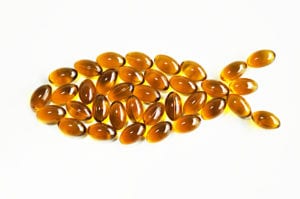Written by Joyce Smith, BS. Fish oil supplementation reduced osteoarthritic pain and burden in sedentary overweight/obese elderly adults and improved their microvascular function and well-being.
 Osteoarthritis (OA) is a chronic, painful, debilitating and progressive joint disease characterized by bone remodeling, cartilage damage and inflammation of synovial tissues and tendons 1. Affecting almost twice as many women as men (18% vs 9.6%) sixty years of age and older, OA often leads to hip and knee replacements, contributing to an already heavily-burdened health care system 2,3. Vascular disease in the affected bones accelerates the disease progression. Minimal efficacy of nonsteroidal anti-inflammatory drugs (NSAIDs) has opened the door for alternative treatments such as fish oils containing docosahexaenoic acid (DHA) and eicosapentaenoic acid(EPA), and curcumin, a polyphenolic compound and popular active ingredient of turmeric (Curcuma longa) 4,5.
Osteoarthritis (OA) is a chronic, painful, debilitating and progressive joint disease characterized by bone remodeling, cartilage damage and inflammation of synovial tissues and tendons 1. Affecting almost twice as many women as men (18% vs 9.6%) sixty years of age and older, OA often leads to hip and knee replacements, contributing to an already heavily-burdened health care system 2,3. Vascular disease in the affected bones accelerates the disease progression. Minimal efficacy of nonsteroidal anti-inflammatory drugs (NSAIDs) has opened the door for alternative treatments such as fish oils containing docosahexaenoic acid (DHA) and eicosapentaenoic acid(EPA), and curcumin, a polyphenolic compound and popular active ingredient of turmeric (Curcuma longa) 4,5.
A current 16-week randomized, double-blinded, placebo-controlled trial of 152 sedentary, obese /overweight older adults (50-80 years of age) reported positive benefits of fish oil and /or curcumin on cerebrovascular function and C-reactive protein (CRP) 6. Researchers continued with a subanalysis7 that further tested the effects of fish oil and /or curcumin on pain reduction and osteoarthritis-specific (OA) burden which included physical and psychological stress, sleep disturbance, loss of productivity, physical limitations and hardship. The team also explored whether pain reductions were the result of improved microvascular function and reduced inflammation and, if so, would these improvements lead to improvements in well-being (including general health perception, mood and depressive symptoms). The participants were randomly assigned to one of four groups: Fish oil group (2000mg/d DHA plus 400 mg/d EPA); Curcumin group (160mg/d); Fish oil plus curcumin group; Placebo group. Outcomes were a reduction in pain and OA burden. Secondary outcomes included treatment-induced changes in self-reported chronic pain and OA burden and whether these changes were related to changes in small artery elasticity (a surrogate marker for microvascular function), CRP (an inflammatory marker) and well-being.
Data analysis revealed that pain symptoms for 70% of participants were found to be mild, most prominent in knees (41%), lower back (39%), and shoulders (31%), and described by 82% of participants as an aching pain. Pain was also strongly associated with OA burden which included reduced physical exercise, difficulty climbing stairs, problems with sleep and weakened joints. One hundred and thirty-one participants (86%) reported chronic pain (based on the McGill Pain Questionnaire) at baseline. Researchers found that participants with greater symptoms of chronic arthritic pain and OA had higher body mass index (BMI), lower Quality of Life and were more depressed.
Compared to placebo, 16 weeks of fish oil supplementation significantly reduced overall chronic pain by 42% (P=0.013) and significantly reduced OA burden by 50% (P=0.05) after adjusting for baseline (BMI). Overall pain reduction was greatest in fish oil recipients who reported higher baseline pain (P<0.001). Pain reductions were also associated with improvements in microvascular function and well-being. The fish oil treatment increased small artery elasticity index (P=0.001) but did not change CRP. Curcumin, alone or in combination with fish oil, did not reduce pain measures.
Researchers believe that the improved endothelium-dependent vasodilatation following fish oil supplementation might improve blood supply to oxygen-deprived tissues, thus restoring oxygen and nutrients to affected joints to reduce pain. This study provides clinical evidence that suggests fish oil and/or curcumin supplementation might be an adjunct pain treatment in elderly people who are overweight or obese and more susceptible to developing arthritis.
Source: Kuszewski, Julia C., Rachel HX Wong, and Peter RC Howe. “Fish oil supplementation reduces osteoarthritis-specific pain in older adults with overweight/obesity.” Rheumatology Advances in Practice 4, no. 2 (2020): rkaa036.
© The Author(s) 2020. This is an Open Access article distributed under the terms of the Creative Commons Attribution License (http://creativecommons.org/licenses/by/4.0/)
Click here to read the full text study.
Posted October 20, 2020.
Joyce Smith, BS, is a degreed laboratory technologist. She received her bachelor of arts with a major in Chemistry and a minor in Biology from the University of Saskatchewan and her internship through the University of Saskatchewan College of Medicine and the Royal University Hospital in Saskatoon, Saskatchewan. She currently resides in Bloomingdale, IL.
References:
- Li G, Yin J, Gao J, et al. Subchondral bone in osteoarthritis: insight into risk factors and microstructural changes. Arthritis Res Ther. 2013;15(6):223.
- Thomas S, Browne H, Mobasheri A, Rayman MP. What is the evidence for a role for diet and nutrition in osteoarthritis? Rheumatology (Oxford, England). 2018;57(suppl_4):iv61-iv74.
- Neogi T. The epidemiology and impact of pain in osteoarthritis. Osteoarthritis Cartilage. 2013;21(9):1145-1153.
- Vista ES, Lau CS. What about supplements for osteoarthritis? A critical and evidenced-based review. Int J Rheum Dis 2011;14:152–8.
- Boe C, Vangsness CT. Fish oil and osteoarthritis: current evidence. Am J Orthop (Belle Mead NJ) 2015;44:302–5.
- Kuszewski JC, Wong RHX, Wood LG, Howe PRC. Effects of fish oil and curcumin supplementation on cerebrovascular function in older adults: a randomized controlled trial. Nutr Metab Cardiovasc Dis 2020;30: 625–33.
- Kuszewski, Julia C., Rachel HX Wong, and Peter RC Howe. “Fish oil supplementation reduces osteoarthritis-specific pain in older adults with overweight/obesity.” Rheumatology Advances in Practice 4, no. 2 (2020): rkaa036
